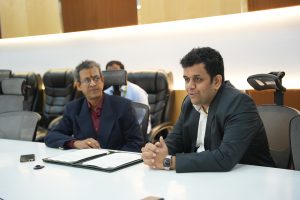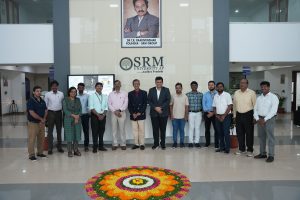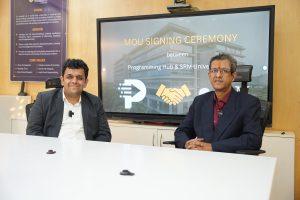MoU Signed with Programming Hub for Launching AI-Powered Marketing Programme
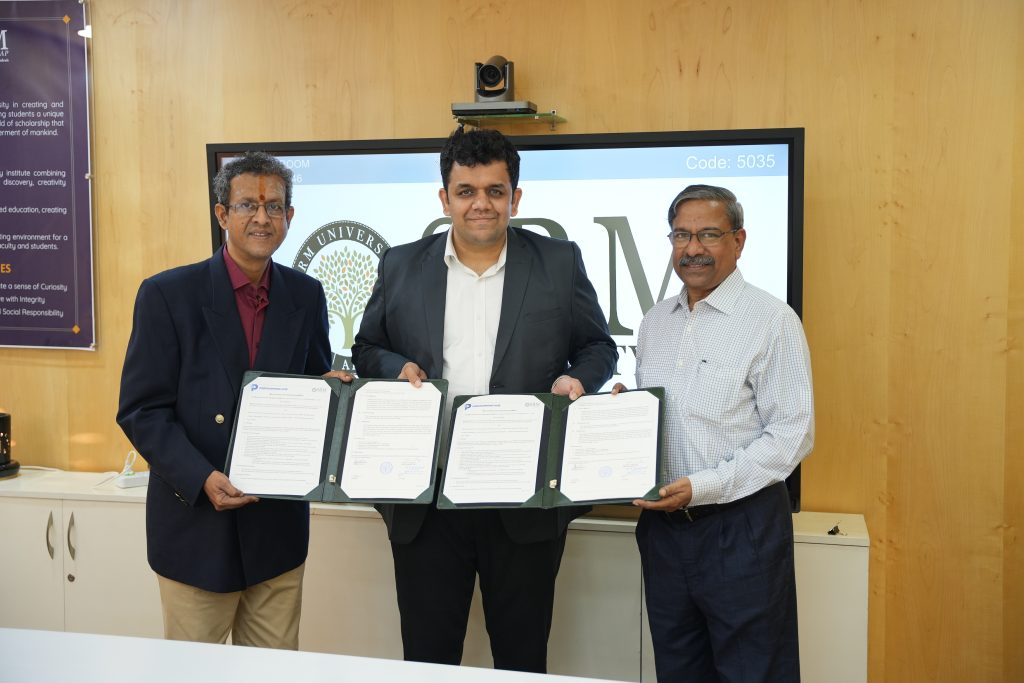
SRM University-AP inks an MoU with the EdTech Company, Programming Hub, to explore the possibility of integrating AI-powered marketing into the academic curriculum, facilitating a new age of empowered marketers. The MoU was signed by Mr Siddhesh Joglekar, CEO of Programming Hub, and Dr R Premkumar, Registrar, in the presence of Prof. Bharadhwaj Sivakumaran, Dean – Paari School of Business and the faculty of the school.
The MoU between the two organisations will assimilate AI-powered Marketing into the teaching pedagogy of the business programmes offered at Paari School of Business to bridge the gap between academia and industry. The association will also ensure the launch of AI-powered marketing programmes at Paari School of Business for prospective students in collaboration with Programming Hub. The partnership will also launch a 120-hour part-time weekend-only world-class certification programme in AI and Marketing.
“With marketing becoming an all-encompassing and essential aspect of business, AI will be the catalyst that supercharges the field of marketing, further boosting businesses into national and international domains. With AI as the key tool, marketing will be the intersection of various domains of science, technology, humanities, entrepreneurship and management”, stated Mr Siddhesh Joglekar, elucidating on the significance of AI-powered marketing on the current business landscape.
Prof. Bharadhwaj Sivakumaran, Dean of Paari School of Business, commented on this constructive collaboration, which will revolutionise the face of marketing in India. “By integrating AI-powered marketing with human-powered marketing, the pace of marketing will swiftly change, shifting students from skilled marketers to skilled decision makers. The AI-powered marketing programme will provide students with the ability to adapt and use AI in diverse ecosystems,” remarked Prof. Bharadhwaj.
With AI revolutionising all realms of management, from media planning and marketing research to customer service and sales marketing, AI-powered marketing can supplement human resources to boost their strategies and guarantee quality results within a short amount of time. SRM University-AP and its management precinct, Paari School of Business, continue to expand their network, fostering collaborations with reputed companies to provide their students with innovative and constructive programmes that will make them the powerhouse of the future.
- Published in Departmental News, News, Paari Current Happenings
A Thought-Provoking Session with Megha Thapar
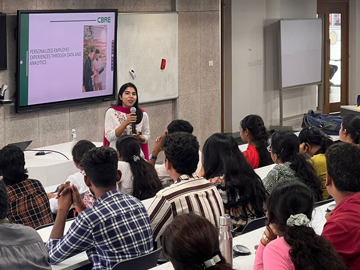 The Management precinct of the Paari School of Business had the honour of hosting an engrossing guest lecture, graced by Ms Megha Thapar, a distinguished Senior Associate Director – DEI. With an extensive 15-year career that spans the Financial Services, Retail, and Real Estate industries, Ms Thapar is renowned for her expertise in Diversity, Equity, and Inclusion (DEI). She brought invaluable insights and experiences to the forefront of this lecture, titled “Personalised Employee Experiences through Data and Analysis,” on August 21, 2024.
The Management precinct of the Paari School of Business had the honour of hosting an engrossing guest lecture, graced by Ms Megha Thapar, a distinguished Senior Associate Director – DEI. With an extensive 15-year career that spans the Financial Services, Retail, and Real Estate industries, Ms Thapar is renowned for her expertise in Diversity, Equity, and Inclusion (DEI). She brought invaluable insights and experiences to the forefront of this lecture, titled “Personalised Employee Experiences through Data and Analysis,” on August 21, 2024.
The primary goal of this session was to enlighten both management students and professionals on the transformative power of data and analytics in crafting personalised employee experiences. Emphasising the critical role of DEI in the workplace, the lecture aimed to showcase how organisations could utilise data to foster more inclusive and high-performing environments. This focus was rooted in the belief that understanding and leveraging data can lead to more equitable and effective organisational practices.
Throughout the event, attendees were engaged with a series of case studies, demonstrating the practical application of data in addressing real-world HR challenges. These included analysing and interpreting key metrics to create significant business impacts. Ms Thapar guided the audience through the intricacies of identifying actionable data, extracting meaningful insights, and implementing strategies that not only enhance employee satisfaction but also bolster organisational efficiency.
The session was instrumental in equipping participants with the critical thinking skills necessary for making informed, data-driven decisions. By delving deep into how data and analytics can revolutionise the employee experience, the lecture illuminated the pathways to advancing DEI initiatives within various organisational settings. Attendees were encouraged to apply the knowledge gleaned from the case studies shared by Ms Thapar, thereby learning to employ data-driven strategies in nurturing an inclusive workplace culture, boosting employee engagement, and aligning with broader organisational objectives.
As the lecture concluded, the outcomes were profoundly impactful. Participants left with a deeper understanding of the role of data in transforming employee experiences and driving DEI efforts. They gained practical knowledge on leveraging data to tackle real-world HR and DEI challenges effectively. Furthermore, the insights into interpreting data, understanding employee behavior, and identifying actionable insights empowered them to initiate meaningful changes within their organisations. Armed with these skills, they are now better positioned to weave DEI principles into their organisational fabric, using data to tailor solutions and foster a more inclusive, equitable work environment. This event not only highlighted the critical importance of analytics in creating dynamic, authentic, and diverse teams but also fostered a greater appreciation for the strategic use of data in achieving high-performance organisational outcomes.
- Published in Departmental News, News, Paari Current Happenings, SEAMS
A Helping Hand: Pro-Chancellor Donate Rs. 3 crores to CM’s Flood Relief Fund
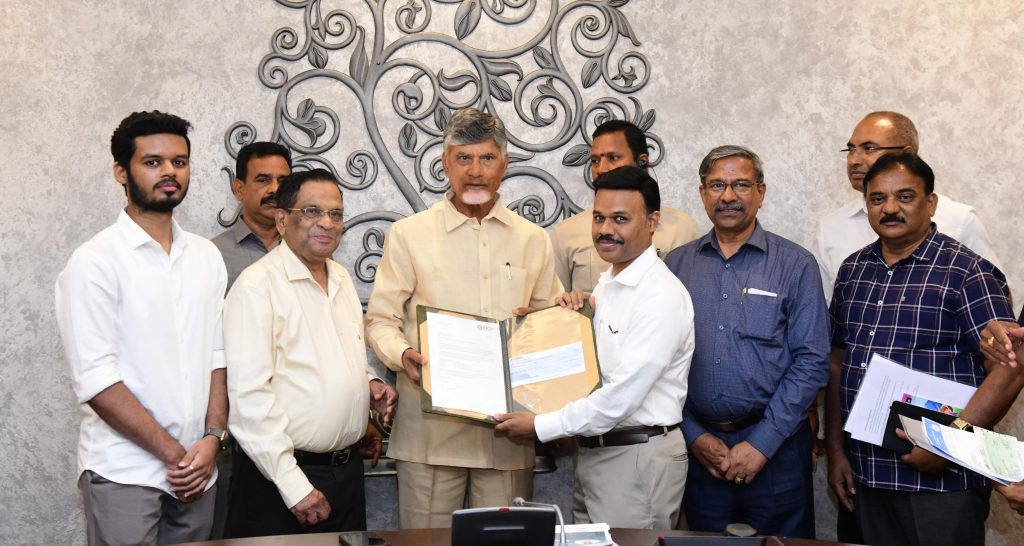
Pro-Chancellor of SRM University-AP, Dr P Sathyanarayanan, has contributed Rs. 3 crores as financial aid to the Chief Minister’s Relief Fund to help rehabilitate and reconstruct the drastically affected areas by the recent floods. The leadership team of the university, including Trustee Shri Balaji Sathyanarayanan, Executive Research Head of SRM Group Prof. D Narayana Rao and Registrar Dr R Premkumar, handed over the cheque to the honourable Chief Minister of the state Shri Nara Chandrababu Naidu at the AP Secretariat.
“It is in the very fabric of humankind to help others who are in need of safety, security and shelter. We at SRM University-AP stand with the state of Andhra Pradesh at this dire hour and will extend our extensive support towards the rehabilitation projects”, stated Dr Sathyanarayanan. Honourable CM Shri Nara Chandrababu Naidu expressed his gratitude for the magnanimous contribution of the university patron.
SRM University-AP also distributed food parcels and other amenities to the flood victims. The distribution program was initiated by Pro-Chancellor Dr P Sathyanarayanan and conducted under the aegis of the Vice Chancellor of the university, Prof. Manoj K Arora. Food packets worth Rs.10 lakh, water bottles, fruits, bread and biscuits were distributed in Gollapudi, Singh Nagar and Vambay Colony areas of Vijayawada.
- Published in News
Dr Nilakantha Meher’s Research Uses Light to Improve Object Detection Precision
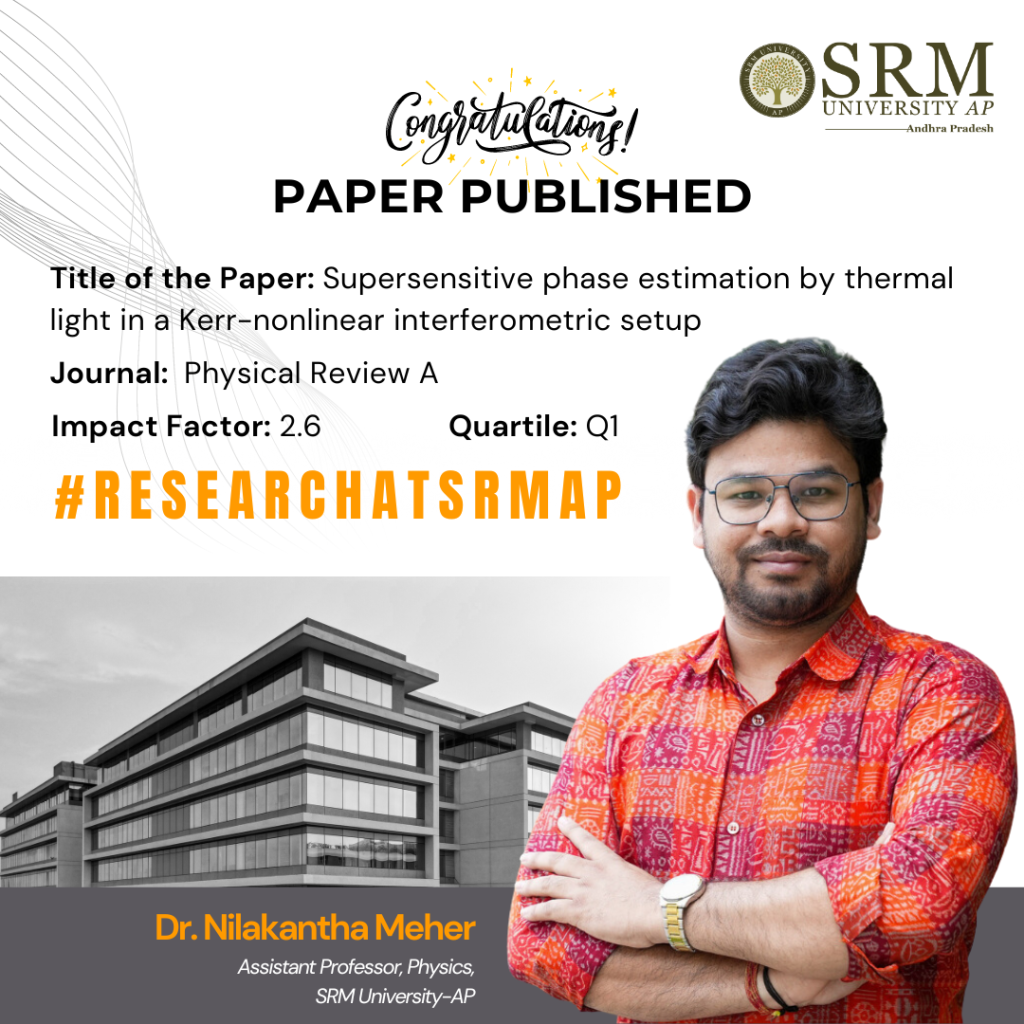
Dr Nilkantha Meher, an Assistant Professor in the Department of Physics at SRM University-AP, has significantly contributed to science with his research paper on using thermal light to detect objects with unmatched precision. This phenomenal work that featured in the journal Physical Review A will positively contribute to the fields of sensing, gravitational wave detection, and phase microscopy.
Abstract:
Estimation of the phase delay between interferometer arms is the core of transmission phase microscopy. Such phase estimation may exhibit an error below the standard quantum (shot-noise) limit, if the input is an entangled two-mode state, e.g., a N00N state. We show, by contrast, that such supersensitive phase estimation (SSPE) is achievable by incoherent, e.g., thermal, light that is injected into a Mach-Zehnder interferometer via a Kerr-nonlinear two-mode coupler. The phase error is shown to be reduced below, being the mean photon number, by thermal input in such interferometric setups, even for small nonlinear phase-shifts per photon pair or for significant photon loss. Remarkably, the phase accuracy achievable in such setups by thermal input surpasses that of coherent light with the same. Available mode couplers with giant Kerr nonlinearity that stems either from dipole-dipole interactions of Rydberg polaritons in cold atomic gas or from cavity-enhanced dispersive atom-field interactions may exploit such effects to substantially advance the interferometric phase microscopy using incoherent, faint light sources.
Practical Implementation:
The proposed nonlinear interferometer in this research can serve as a robust quantum sensor, making it suitable for a range of applications, including object sensing, gravitational wave detection, and phase microscopy.
Your Collaborations:
Prof. Gershon Kurizki (Weizmann Institute of Science, Israel)
Prof. Tomas Opatrny (Palacky University, Czech Republic)
Dr. Eilon Poem (Weizmann Institute of Science, Israel)
Prof. Ofer Firstenberg (Weizmann Institute of Science, Israel)
Future Research Plans:
He is currently investigating the sensing of quantum entanglement and generating highly nonclassical states using various nonlinear interferometers. This research has significant implications for distributed quantum communication and quantum information processing.
- Published in Departmental News, News, Physics News, Research News


